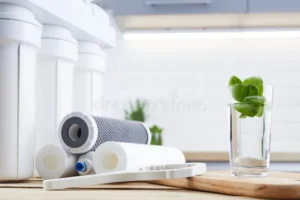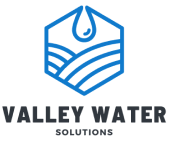If you live in an area with hard water, you are probably familiar with the signs of hard water, such as white spots in dishes, soap that does not lather well, dry skin, and buildup around faucets. Hard water is not only harmful to your health, but it can also create many everyday problems at home. This is where a water filtration system for hard water comes in. In this blog, we will provide you with a deep guide about the best water filtration for hard water.
At Valley Water Solutions, we understand the importance of clean and soft water for your daily comfort and the efficiency of your home. In this guide, we will walk you through hard water and how it affects your household and the best water filtration system. We will also help you choose the right solution depending on the quality of your water, budget, and household needs.

What is Hard Water?
Hard water contains a high level of minerals, such as calcium and magnesium. These minerals dissolve in water that passes through limestone and chalk in the ground.
Water hardness is usually measured in grains per gallon (GPG) or milligrams per liter (mg/L). The higher the number, the harder your water. Most homes in rural or groundwater-fed areas face hard water challenges.
Why is Hard Water a Problem?
Hard water does not pose a serious health risk, and it can also cause multiple issues, such as
Limescale Buildup: Minerals in the hard water can leave residue in pipes, kettles, and water heaters, which reduces the life of the appliance.
Poor Soap Performance: Minerals reduce the effectiveness of the soap and create soap scum.
Skin and Hair Issues: Hard water can leave the skin dry and irritated. It can make your hair feel rough and brittle.
Stained Surfaces: Fixtures, sinks, and glassware can get white spots and discoloration.
The best solution to prevent these problems is a proper water filtration system, which is designed for hard water.
Best Water Filtration System For Hard Water
There are different types of systems available to treat hard water. Here are some of the best filtration options that we recommend at Valley Water Solutions:
1. Water Softeners (Ion Exchange Systems)
A water softener is the most well-known and useful way to treat hard water. It works through an ion exchange process by replacing the calcium and magnesium ions with sodium or potassium ions.
Benefits:
- Properly removes the hardness-causing minerals
- Stops limescale buildup
- Increases the life expectancy of the appliances
Best for:
- Whole House Solutions
- Medium to very hard water
2. Salt-Free Water Conditioners
Also known as descalers, these systems do not remove the minerals but alter the structure so they do not stick to surfaces. These are great if you want low maintenance without adding the salt to the water.
Benefits:
- Environment friendly
- No salt or waste wastage
- Low maintenance
Ideal For:
- People are concerned about the sodium intake
- Areas with moderately hard water
3. Reverse Osmosis (RO) Systems
Reverse Osmosis systems are often installed under the sink in the kitchen. These systems are mostly used for drinking water, and they can also remove the hard minerals from the water effectively.
Benefits
- Removes a wide range of contaminants, such as lead, chlorine, and fluoride
- It provides an excellent taste of water
Ideal For:
- It is a good choice for drinking and cooking water
- Homes with slightly hard water and high TDS
4. Dual Tank Water Softeners
If you have a large household or a continuous usage of water, a dual-tank softener makes sure that you always get soft water. However, one tank regenerates, and the other continues to supply treated water.
Benefits
- No downtime during the regeneration
- Long-lasting performance
- It is suitable for high water usage
Ideal for
- It is the preferred choice for large families
- Homes with extremely hard water
Choosing The Right Filtration System
It is good to select the best water filtration system for your hard water, and it depends on a few key factors:
1. Water Hardness Level
Get your water tested to know if your water is hard. This determines your need for the filter, whether you need a basic conditioner or a powerful softener.
2. Household Size and Usage
If you have a large family, then the use of water is more, and you need a system with greater capacity or dual tanks.
3. Cost and Maintenance
You need to take into account the initial cost, salt refills, amount of water wasted, and the schedule for when the filter needs to be changed.
4. Space and Installation
Some systems are installed at the point of entry for whole-house treatment. Others fit under the sink for drinking water.
Why You Should Choose Valley Water Solutions
At Valley Water Solutions, we build customized water treatment systems based on the condition of your local water. Our team provides the following services:
- Free in-home water testing
- Professional consultation
- Installation and maintenance services
- Budget-conscious systems that last
Some Of the Advantages Of Using Water Filtration for Hard Water
When you install the proper filtration system, you will see the results in your water:
- Clean laundry that maintains colors
- Appliance and plumbing longevity
- Softer skin and hair after showers
- Dishes dry without spots that leave clean surfaces
- Energy savings by using efficient appliances
Conclusion
Hard water is a widespread problem, and a good water filtration system can make a huge difference. Whether it is a water softener, a salt-free conditioner, or a reverse-osmosis unit, always verify it is suitable for your water quality and your household’s needs prior to purchase.
Valley Water Solutions is here to help you through the entire process. We hope to help you get the best water filtration system for your hard water in order to enjoy better water – and therefore a better life!
Need help picking the right system?
Contact Valley Water Solutions today to schedule a free consultation and water test. Let’s put hard water issues behind you.
Frequently Asked Questions (FAQs)
1. How do I find out if I have hard water?
There are several signs, including white spots on your dishes, dry skin, dull laundry, or limescale on your faucets. You can just have the water tested for hardness level.
2. Is hard water bad for my health?
Hard water is not a health risk to drink, though it can dry out your skin and irritate your scalp. But its effects are primarily on plumbing, appliance life, and soap performance.
3. Do I need a water softener and a reverse osmosis system?
Yes, every now and then. A softener correctly treats your entire house’s water, and a reverse osmosis system provides purified water for drinking and cooking purposes.
4. How often do I have to maintain my water softener?
Generally, a monthly check of the salt levels is needed, and a yearly inspection of the system to ensure it is functioning well.

